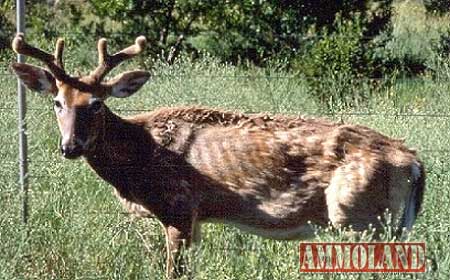

Harrisburg, PA -(Ammoland.com)- With deer firearms season in full swing, about 1,100 DMA 2 Antlerless Deer Permits remain.
There’s still a chance for hunters to secure antlerless deer permit to use during the 2014-15 deer seasons.
As of this morning, about 1,100 DMA 2 Antlerless Deer Permits remained. That’s about 9 percent of the 13,000 permits allocated.
The permits, which were allocated in an effort to slow the spread of chronic wasting disease in Pennsylvania, can be used to take antlerless deer in any deer season within the portions of Bedford, Blair, Huntingdon, Cambria and Fulton counties that make up Disease Management Area 2 (DMA 2).
The permits may be purchased online through The Outdoor Shop on the Game Commission’s website, and hunters can make application for an unlimited number of permits.
Hunters should note, however, they cannot hunt with the permits until they receive them in the mail, so anyone looking to secure a permit for the statewide firearms deer season underway now needs to act fast. The permits also may be used in the flintlock muzzleloader and late archery deer seasons to run from Dec. 26 2014 to Jan. 10 2015.
DMA 2 includes portions of three Wildlife Management Units – WMUs 4A, 4D and 2C, and allocations of regular antlerless licenses in those WMUs have been sold out for many months.
There are some differences between the application process for a DMA 2 permit and that for an antlerless license.
Only residents and nonresidents ages 12 and older with valid general hunting licenses may apply for permits. Participants in Mentored Youth and Mentored Adult hunting programs are ineligible to make application, and the permits cannot be transferred to participants in those programs.
Each permit costs $6.70, and payment must be made by credit card, or check or money order made payable to the “Pennsylvania Game Commission.”
Applications for DMA 2 permits are accepted in two ways – electronically through the Game Commission’s Outdoor Shop, or by mail. Please note, however, that few permits remain and mailing the application decreases the chances of being awarded a permit or receiving one for use in the statewide firearms deer season.
The Outdoor Shop can be accessed at www.theoutdoorshop.state.pa.us. Once entering the Game Commission’s Outdoor Shop, click on “Permits” and select “DMA 2 Antlerless Deer Permit” at the bottom of the permits page. Those making application electronically must pay by major credit card.
Those making application by mail can pay by check, money order or major credit card. Application forms can be obtained at the Game Commission’s website, the agency’s Harrisburg headquarters or any region office.
Applications that are mailed should be placed in a regular envelope. Multiple applications can be sent in one envelope.
The application schedule is now in the third round, when eligible applicants may submit an unlimited number of applications. The round will continue until all permits have been issued.
DMA 2 is the lone area of the state where CWD has been detected in free-ranging deer.
A total of 13,000 permits were made available with the intention of reducing the deer population by one deer per square mile in DMA 2.
Responding to a need identified by the Pennsylvania Board of Game Commissioners, the permits seek to focus hunting pressure inside the DMA, where deer numbers must be kept in check to slow the potential spread of CWD. At the same time, the permit system enables the Game Commission to avoid a reduction in the deer herd in the area surrounding DMA 2 – where CWD has not been detected.
“Our CWD Management Plan guides us to increase the antlerless deer harvest in areas where CWD has been detected in free-ranging deer,” Game Commission Executive Director R. Matthew Hough said.
“If we attempted to reach that goal by increasing the allocation of antlerless licenses throughout an entire WMU, or in this case, a number of WMUs, we wouldn’t necessarily achieve the population goal because the license might be used outside the DMA rather than within it.
“With the permits, we can direct hunting pressure more precisely into the area that most needs additional deer harvests,” Hough said.
Those who are issued DMA 2 permits are required to submit reports, regardless of whether they harvest a deer. Harvests must be reported within 10 days. Nonharvests must be reported by Feb. 5. Those who fail to report as required are subject to criminal prosecution and may be ineligible to apply for permits if the program is continued the following year.

Through their reports, hunters provide valuable data that play a crucial role in the Game Commission’s management of CWD.
Special rules apply to those hunting or residing within a Disease Management Area. Hunters harvesting deer within a DMA should be aware that the deer parts with the highest risk of transmitting CWD – namely, the head and backbone – may not be transported from within the DMA to outside the DMA, unless by special exception. Hunters who live outside a DMA in which they hunt should make plans to use a processor or taxidermist within the DMA, or on the Game Commission’s list of approved processors and taxidermists. Dumpsters also have been set up on game lands within DMAs, and hunters who do their own processing can drop off high-risk parts there before transporting the meat and other low-risk parts outside of the DMA.
The feeding of deer and use of urine-based deer attractants are among the other practices prohibited within DMAs. A complete list is available at the Game Commission’s website, www.pgc.state.pa.us.
CWD affects members of the cervid, or deer family. It is spread from animal to animal by direct and indirect contact.
Pennsylvania is among 22 states and two Canadian provinces in which CWD has been detected.
CWD is always fatal to the cervids it infects, but there is no evidence the disease can be transmitted to humans.
More information on CWD can be found at the Game Commission’s website.
